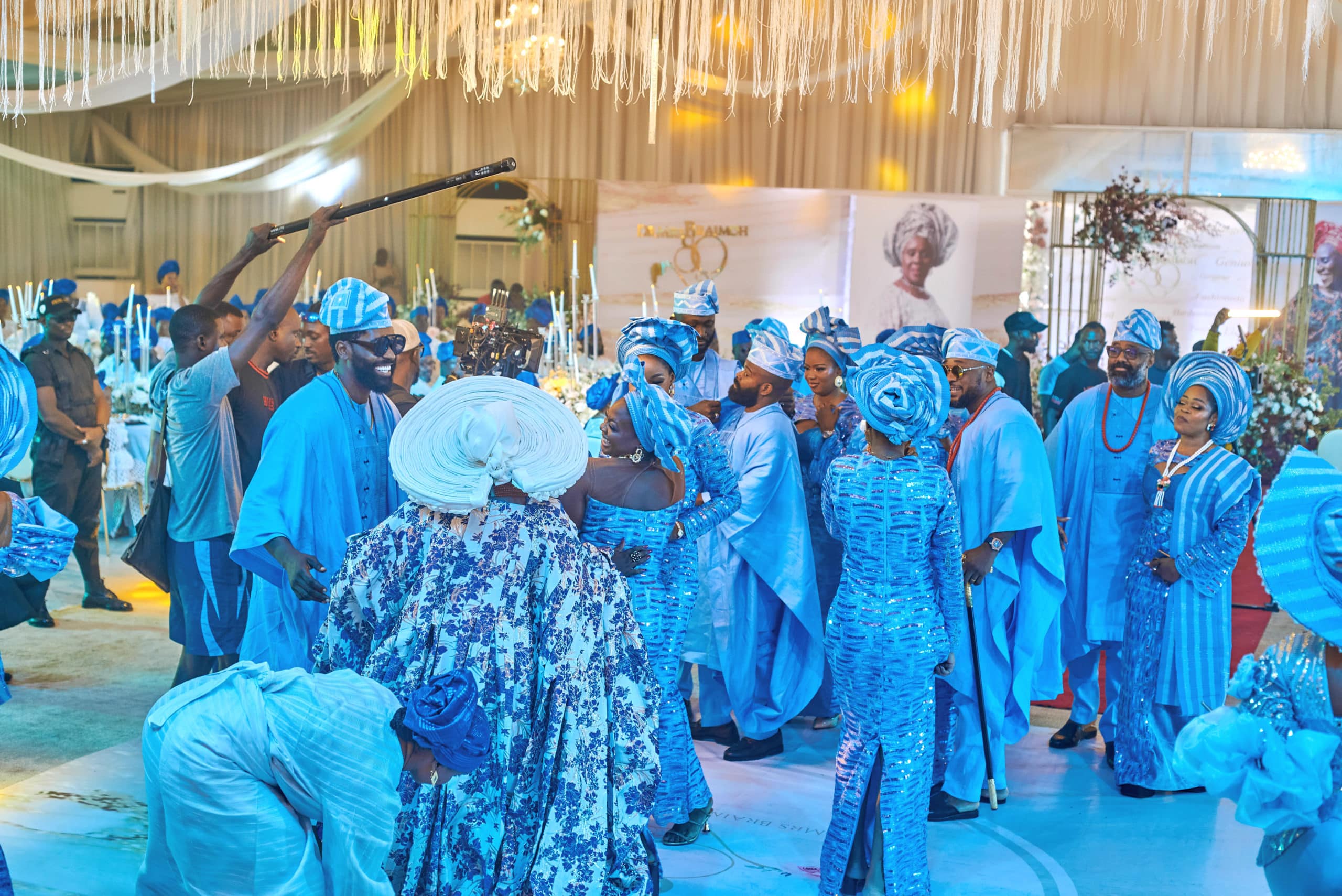Present-day Nollywood is a thriving industry and a key component of Nigeria’s economy. Churning out over 2,500 films a year, the country’s film sector is not just a cultural phenomenon but also a ticket to the world.
In the Lekki district of Lagos, Nigeria’s largest city, the crew on the set of a new film has taken over a local event center, transforming it into a lavish venue to shoot an elaborate birthday party scene. Under the harsh glare of the bright lights, actors diligently rehearse their lines even as the director and crew make crucial last-minute adjustments for the next shot.
The decor and meticulously-designed sets illustrate the grandeur of the film. Amidst this frenzied flurry, the dreams and aspirations driving these individuals shine brighter than the motivated lights on them. Nollywood, a term that emerged in the early 2000s, captures the essence of Nigerian cinema. And yet its origins are older, going as far back as the 1960s, around the time that the country gained its independence.
Pioneering filmmakers in Yoruba, Hausa, and Igbo languages set the groundwork.
“The early days were tough,” recalls British-Nigerian actor, Wale Ojo. “Films were shot on celluloid, and piracy was rampant. But the entre- preneurial spirit of the 1990s revitalized the industry, leading to what we now call Nollywood.”
Loading...
“We are changing the economy,” Ojo asserts of the industry in its current avatar. “The industry is a major employer and has immense potential for growth.”
Over the past few decades, Nollywood has transformed from one with a modest beginning into a vibrant, thriving industry, producing an estimated 2,500-plus films annually. It is recognized as the world’s second-largest film industry in terms of volume, trailing only Bollywood and leading Hollywood.
“The market, for us, was not ready. Cinema, Netflix, [Amazon] Prime were not ready for us… even if I have to put a lot of money into production, how do I recoup it? So when Netflix came around, [along with Amazon] Prime and cinema, I said, ‘okay, this is the time to do it’,” says Jaiye Kuti, who started acting 22 years ago.
The industry’s growth is reflected in its widespread international popularity, thanks to partnerships with global streaming platforms. Nollywood films, such as Breath of Life, have garnered attention and awards, with Ojo himself winning recognition as Best Lead Actor at the recent edition of the Africa Magic Viewers’ Choice Awards for Breath of Life.
“I feel like they’ve done a lot of work, they’ve commissioned a lot of projects, but there’s a lot of room for more platforms and more channels for our art to be disseminated,” says Timini Egbuson, one of the lead actors in Nigeria’s reportedly highest-earning film, A Tribe Called Judah.
“Our cinema culture is actually growing a lot. The last movie I was part of made 1.6 billion naira at the box office. That’s definitely a step in the right direction.
“Nollywood is growing faster than we all thought. The quality of our productions is getting a lot better. The quality of our stories that we’re telling, acting, funding, profits— everything is kind of in the positive and it’s a good time to be in Nollywood,” Egbuson adds.
Films in the industry often delve into themes central to Nigerian and African identity, from family dynamics and religious beliefs to social issues. They challenge stereotypes and offer an authentic representation of African stories, celebrating resilience and cultural richness.
“Nollywood films offer a mirror to Nigerian society,” says Joke Silva, a prominent actor and producer.
“They break stereotypes and provide real depictions of African life.”
But despite its documented successes, the industry also faces significant challenges. One major hurdle is the unreliable electricity supply that plagues all of Nigeria.
“The biggest challenge is NEPA,” Ojo notes, in reference to Nigeria’s electricity provider. “We often rely on generators, which is neither cost-effective nor sustainable. It’s a major impediment to production.” Economic constraints also seem to impact the industry. While top-tier actors and filmmakers can earn well others struggle with financial stability. Ojo advocates for a stronger support system for actors facing health and financial crises. “There should be a strong union to support actors financially if they fall ill. The government should back this up, ensuring no actor has to suffer due to lack of support.”
Nollywood continues to evolve, with New Nigerian Cinema marking a shift towards higher production values and international collaborations.
“We are in the middle of a cinematic revolution,” Ojo says. “American companies are looking to Nigeria for new projects. There’s a synergy happening that’s bringing global attention to our industry.”
One of the most ambitious projects on the horizon is the development of a $100-million Film City in Lagos. This facility aims to attract international productions and provide state-of-the-art infrastructure.
“A properly-structured film village will bring significant income into the country,” Ojo predicts.
Nollywood’s inclusivity is evident in its linguistic diversity, with three major sub-industries: Yoruwood (Yoruba-speaking), Kannywood (Hausa-speaking), and Igbowood (Igbo-speaking).
Each sub-industry brings unique cultural narratives and styles, enriching Nigeria’s cinematic landscape. Kannywood, based in Kano, intertwines storytelling with Islamic themes and Hausa culture. Igbowood highlights the traditions and societal issues of the Igbo people, while Yoruwood, thriving in the South West, is known for its dramatic flair and exploration of Yoruba heritage.
Furthermore, Nollywood’s journey has been shaped by key films and directors. Living in Bondage (1992) is of- ten credited with launching the modern Nollywood era. The industry has produced notable films and stars that have gained international recognition.
Films like Citation (2020) by Kunle Afolayan have won international awards, and actors like Genevieve Nnaji have become household names far beyond the borders of Nigeria. Nnaji’s film, Lionheart, was acquired by Netflix, making it the first Netflix Original film produced in Nigeria.
Media mogul Mo Abudu has also earned a reputation in the African media landscape, and one that resonates far beyond the continent’s borders. EbonyLifeTV, which she founded in 2013, reportedly boasts around 30 shows that are under production.
“The highlight, for me, is always about making great shows. I’m always fascinated by the idea that I can wake up and I know that we’re working on a new production,” she said in a previous interview with FORBES AFRICA.
Recognized as one of the 25 Most Powerful Women in Global Television by The Hollywood Reporter and also as one of Forbes’ 100 Most Powerful Women in the world, Abudu’s work continues to garner acclaim, furthering the reach of Nollywood.
Silva reflects on the industry’s growth: “One of the things I always said about ten to fifteen years ago was that a time would come when there would be so much wealth for everybody. Technology has made storytelling more accessible and affordable compared to the old days of celluloid.”

Nollywood’s economic impact is profound. With an output of over 50 full-length feature films weekly, Nollywood supports a vast workforce, employing over 300,000 people directly and up to a million in-
directly, making it one of the largest employers in Nigeria, contributing significantly to the country’s economy and job market. Yet another report released by the Nigerian Entertainment Conference (NECLive) in November last year, says the sector has moved from the production and distribution of 1,800 films worth $5.1 billion in 2013 to 2,500 films worth $6.4 billion. The industry is projected to reach an estimated $14.82 billion revenue in 2025. Whatever the figures may be, they point to upward growth.
“The ecosystem of the Nigerian film industry is incredible. Every project creates a new world, involving about 70 people for just one production,” Silva adds.
Oyin Lasisi, a movie producer, further underscores the industry’s role in job creation.
“As far as employment is concerned, it has been amazing — people getting jobs around here. We have created a whole lot of things for people to do. In the las month, people have been getting di-ferent kinds of jobs as far as production is concerned. And it’s been great; we intend to keep t moving, to ensure that everybody is employed.”
The ripple effect of Nollywood’s growth can be seen in various sectors, from fashion and music to tourism. The industry’s demand for skilled labor has led to the de- velopment of numerous training programs and workshops, further enhancing the skillsets of Nigerian professionals.
The sector still faces funding and distribion challenges though.
“I’ve made movies that didn’t make anything back, and I’ve spent millions of naira… As far as marketing is concerned, it’s something you cannot predict,” offers Lasisi.
The influence of Nollywood extends beyond entertainment, playing a crucial role in shaping percep- tions of Africa.
“Nigeria is going to be the powerhouse of the creative economy. We’ve made it possible for Africa to tell its own stories. Nigerian fashion, music, and films are selling Nigeria to the world,” Silva says.
The future of Nollywood is promising, with as rations of greater self-sufficiency and global influence. Silva envisions a Nigerian- owned streaming platform to rival global giants su h as Netflix and Amazon Prime.
“We love Netflix and Amazon, but we want s mething indigenous. The time is ripe for our own studios where we have control of the space.”
Corroborating Silva’s statement, Kuti adds, “It’s getting better every day, and I think we can still do better, as long as we have the funding capacity. I think two, three, four people ar coming together now… So once we can come to that mentality of coming together, you know, put resources together, we can achieve more.
Loading...
